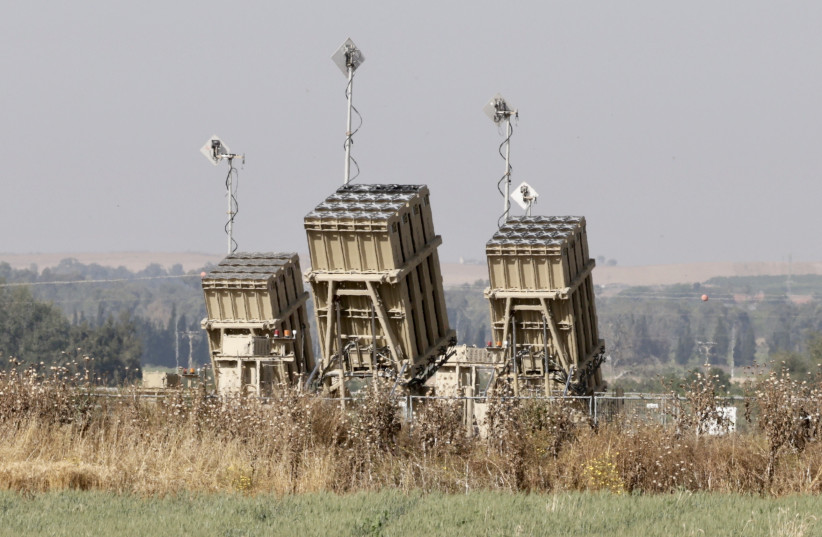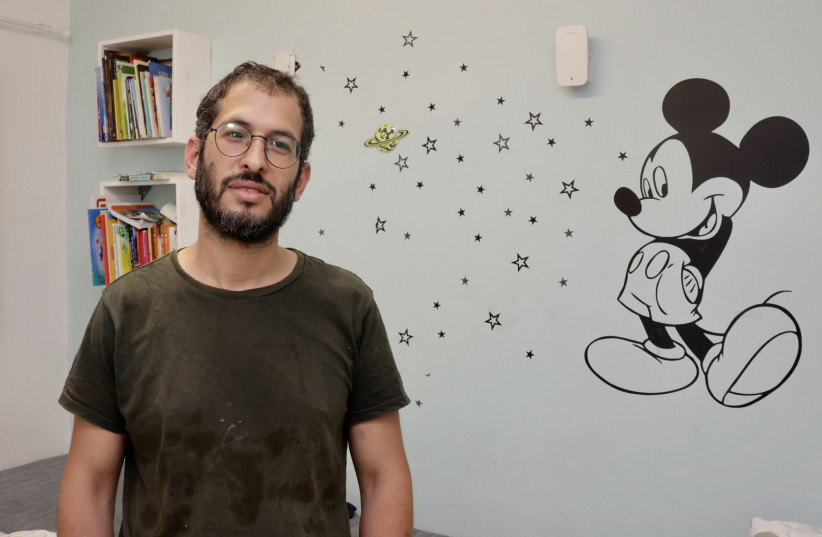Ishai Trabelsi can’t fit his family of seven in one small safe room, with space for only four beds.
“When rockets fall, we don’t sleep,” he said as he stood in the protected space in his Sderot home.
A cheerful Mickey Mouse was painted on the wall and a stuffed tiger was tucked into the corner of one of the beds, but his family is absent.
When the sirens rang across the southern border city this week to warn of incoming rockets launched by the Palestinian Islamic Jihad in Gaza, Trabelsi, his wife and five children relocated to her parent's home near Ashdod to get out of the line of fire.
So they missed the moment when the rocket fell across the one-lane street where they live, damaging their neighbor’s home.

But they knew about it immediately because of the multitude of calls they received to see how they were and to let them know about the attack. Some of their friends even sent photos.
Trabelsi returned alone on Thursday to do some work in the storage unit on his lawn where he keeps boxes of glass siding for his shower stall business.
He worked in the yard, despite the imminent danger, donning a knitted skullcap, black jeans, a grey T-shirt and sneakers. A string of Israeli flags was strung across the lawn and a red bike lay on its side in the corner.
The black-haired man smiles easily as he speaks, despite the seriousness of the danger that he and his city face.
From Gush Katif to the Gaza border
It’s a drama that he has been in the middle of his whole life, given that he was raised in the former Bedolah settlement in Gush Katif and was evacuated from there with his family by the IDF at age 19 when Israel pulled out of Gaza in 2005.
At the time, it was believed that the move would put an end to the Gaza rockets that have targeted Sderot since 2001.
Trabelsi said he was never under any such illusion, and that his stance has proven to be true as the Palestinian rockets have only grown more powerful and can now target the center of the country.
He moved to Sderot 14 years ago, despite the rockets and, although his family has taken a break, he has no plans to leave.
But the missiles, he said, have taken their toll on the family.
During the violent riots along the Gaza border in 2018, known as the Great March of Return, his son was so traumatized by the sirens, that the family would leave the city for the weekends to give him a break.
“It didn’t matter if there were actually sirens, whether it was quiet or not quiet, he needed a break,” Trabelsi said.

What he has noticed this week, Trabelsi said, is how the body absorbs the weight of the danger around it as underscored by the sirens and explosions.
“I suddenly understood how much stress there is in my body,” he said.
“When there is a siren you know that there is a rocket and they are firing at you and your life is in danger,” he said.
“When there is an explosion, then you know it is close,” he added. “There is a fear that any moment a rocket can fall and the imagination takes over,” he said.
“It’s not the fear has grown,” Trabelsi said, but that rather he has become more attuned to the physical impact.
Still, he is among those who support the government’s campaign and believe that the Palestinians want to destroy Israel, so the country must stand strong and push back.
“This is a battle for our lives and we are not willing to give up,” he said.
